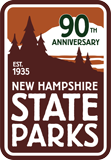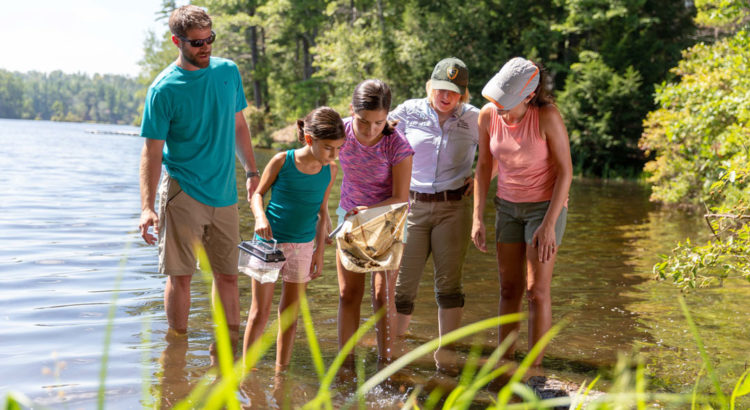By Eilís Donohue, Interpretive Ranger at Franconia Notch State Park
Hey there! One of your 2019 Franconia Notch State Park Interpretive Rangers here. Since I often get asked who I work for, what I do, and what all the patches on my uniform mean, I figured I ought to put all that information in one place. Here’s your definitive answer on what my eight coworkers and I do, stationed around the state of New Hampshire.
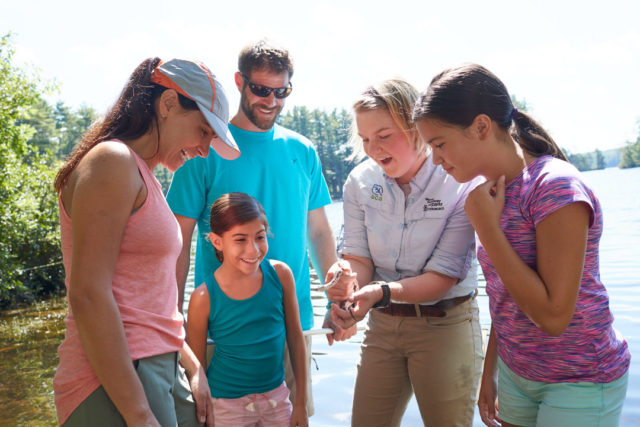
What is “interpretation”?
The word itself has several meanings; even within the context of cultural and natural interpretation, definitions vary. The common denominator of those definitions, though, is that interpretation involves making subject matter more accessible, understandable, and ultimately enjoyable for an audience.
According to the National Association for Interpretation (NAI), the organization through which all of us have earned the status of Certified Interpretive Guide, interpretation is
“a mission-based communication process that forges emotional and intellectual connections between the interests of the audience and the meanings inherent in the resource.”
NAI
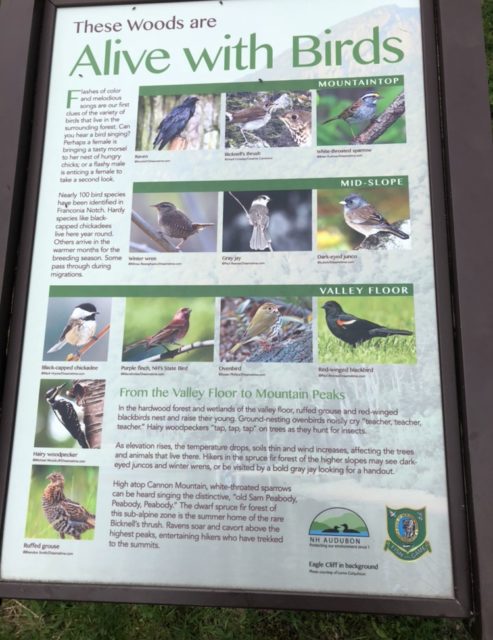
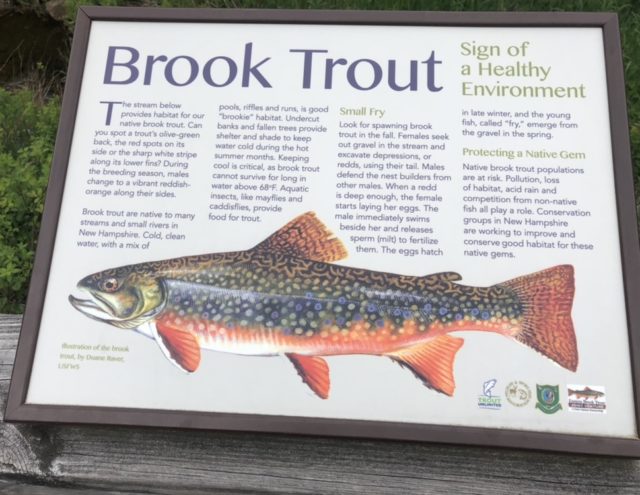
So what does an Interpretive Ranger do?
To clarify, we are not affiliated with law enforcement in any way—many people conflate us with park rangers who are in charge of monitoring for illegal activities in parks. Our blue uniform shirts may also contribute to that confusion, but we’re here for give you information and enrich your visit, not issue parking tickets!
Now for more specifics on my job. This is a seasonal position made available through a collaboration of several organizations (see the next section).
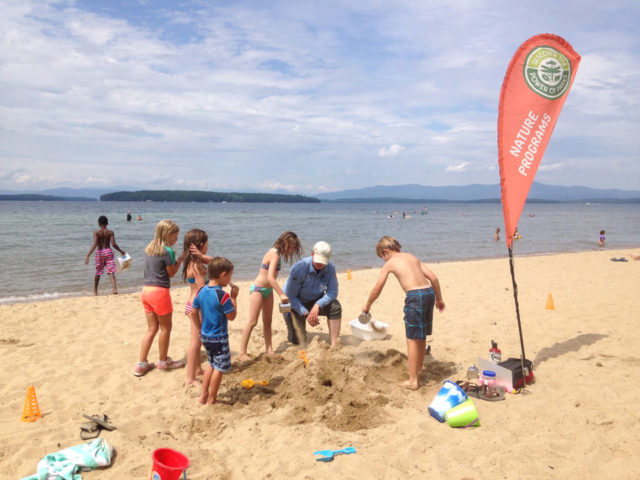
During the winter and spring, we all served alongside the Conservation Stewards (the other 2/3 of the NH Corps) as educators in elementary schools. (Refer to my colleague Sarah’s blog post for a snapshot of life at Bear Brook during this time.) We taught third through fifth graders about nature and science, with a focus on space – and place – specific topics; the students learned about southern New Hampshire ecosystems, plants, and animals, and could apply their knowledge to the world around them.
In May, the Interpretive Rangers led field trips in Bear Brook State Park. The elementary school classes whom we taught in the winter came to visit the park, and got to experience a range of interpretive programs such as ponding for macroinvertebrates and guided nature walks.
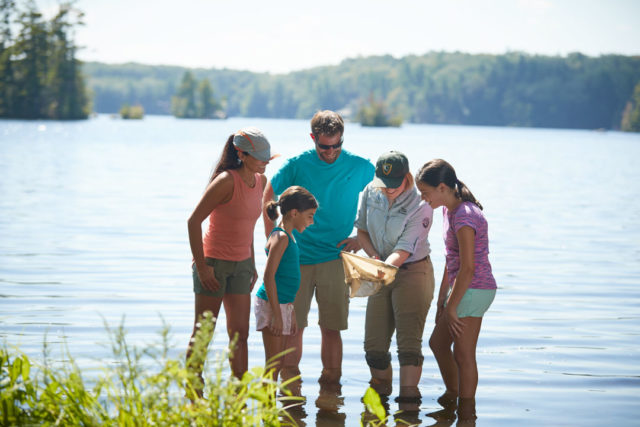
From June through August, we each work in one or more state parks, providing interpretive programming for the public. Some Rangers rove between parks each week, serving two or three areas this way; some Rangers, such as Sarah and myself, remain in one park for the whole season.
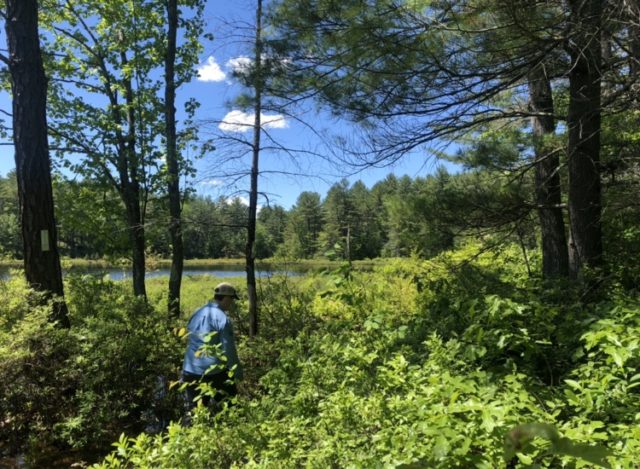
Every Ranger’s position is somewhat unique; in September and October, we shift around to accommodate the exodus back to school and the relative emptying out of parks. Besides Sarah and myself, who will remain at Franconia Notch to serve hikers and campers toughing it out into the beginning of fall, the other Rangers will be doing fall outreach. This means they establish connections with community organizations, schools, libraries, and so on, to continue providing environmental education in different venues.
Okay, but what is an interpretive program?
In this context, a program is an activity, talk, or guided walk that connects visitors to the natural and cultural resources in the park. Some examples include:
- Wildlife talks: Rangers share their knowledge and passion for all kinds of creatures, from frogs and fish to birds and bats!
- A wild edibles walk: learn which plants are safe, and tasty, to eat!
- Explore a park after dark: take a guided night hike with a Ranger to learn what goes on in the woods at night.
- DIY nature crafts: wildlife you can take home, including butterflies, loons, fish, flowers, and more.
- Stargazing: on clear nights, a state park is a perfect place to see plenty of bright stars (away from distracting city or suburb lights). A Ranger can point out fascinating constellations and tell you all about the science of the night sky.
- Campfire stories: unwind after a day of hiking by listening to a Ranger tell local legends and silly stories.
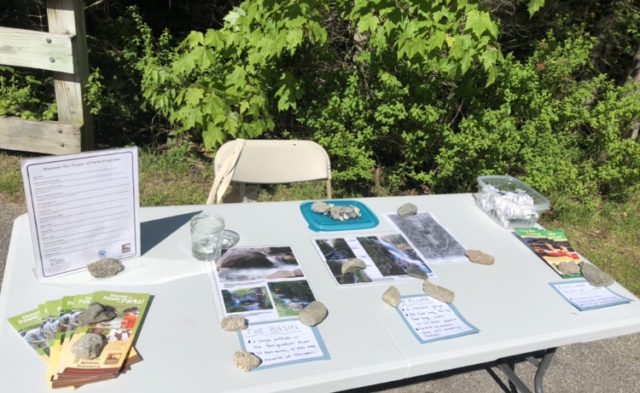
These are just a few examples of all of the free programs we are offering this season. Check out the schedules for each park here, and join us for a program or two!
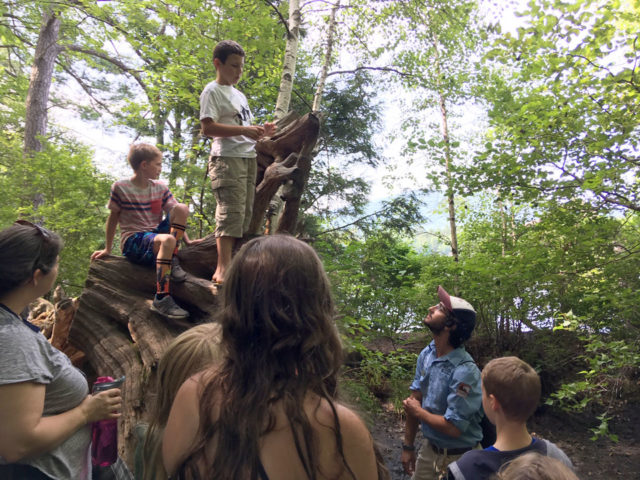
What are all those patches on your uniform?
I am completing a 10 month service position through the joint New Hampshire Corps: Student Conservation Association (SCA) and AmeriCorps. Not all SCA programs are AmeriCorps eligible, nor are all AmeriCorps positions connected to the SCA—the NH Corps is just a unique collaboration between the two organizations!
The SCA is a nonprofit organization, whose mission is “to build the next generation of conservation leaders and inspire lifelong stewardship of the environment and communities by engaging young people in hands-on service to the land.” The organization was founded in 1957 by Elizabeth Cushman Titus Putnam, who modeled her idea after the Civilian Conservation Corps, an agency created to employ young men in service to the land in the 1930s. The SCA now has thousands of members who have done millions of hours of service for the environment. Read all about it here!
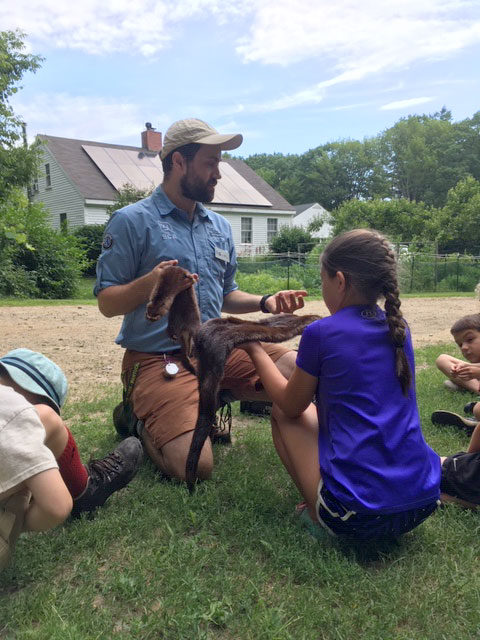
According to their website, AmeriCorps is “a network of national service programs” that provides opportunities to volunteer and engage with communities. The programs include tutoring youth, fighting poverty, protecting and conserving the natural environment, and more. Explore the different programs here.
Additionally, we are partnered with the New Hampshire Division of Parks and Recreation. We are “on loan”, so to speak, to different state parks for the season, providing the only naturalist programs in the parks. Find out more about each NH State Park here.
Lastly, the programs we create and deliver are all part of the statewide Discover the Power of Parks Program, which receives funding from the energy company Eversource.
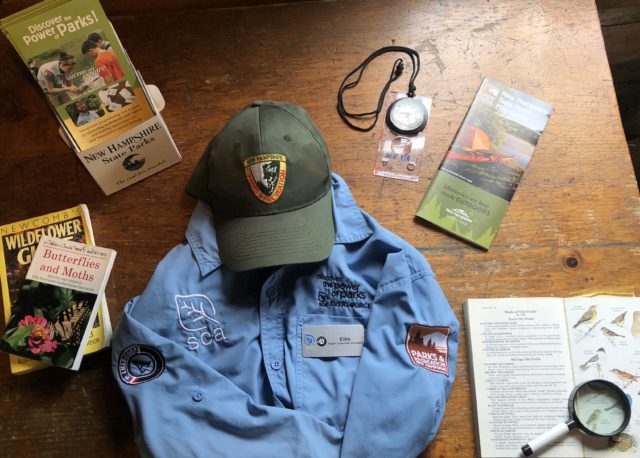
What is the best part about being an Interpretive Ranger?
One of my favorite parts of this position is that we have gotten to create a wide variety of experiences for the public, but all framed by the concept of environmental education. Formal education in the classroom, guided field trips, and interpretive programming in a state park are all very different venues for teaching and learning, but each has their merits and taught me something valuable.
I love that I am able to pass on my passion for nature and science to the public. I am happy to answer curious questions and delighted to see peoples’ faces light up when they learn something new and surprising. Being able to foster connections between the public and the vast and beautiful resources available in Franconia Notch State Park is a privilege!
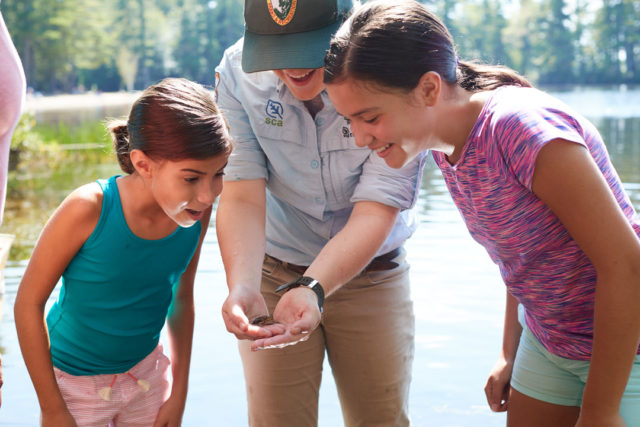
Certifications are another perk of this particular position. As part of the requirements to serve as Rangers, we all got several certifications, that we can happily take forward in our careers. By being included as part of the program, these trainings were made vastly more accessible than they would be to us otherwise. One of these was WFR—we are all Wilderness First Responders, meaning we are trained to respond to emergencies in remote areas. We are also Certified Interpretive Guides, through the National Association for Interpretation. We are also trained in Leave No Trace (LNT), a useful framework to guide ethical behavior in the outdoors.
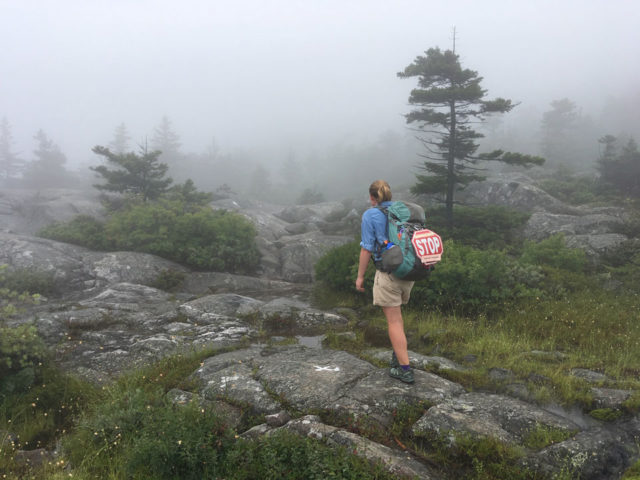
But undeniably one of the best perks is getting to live in beautiful state parks for nearly a year!
Wow, sounds awesome! How can I do something like this?
So, now you know what an Interpretive Ranger does—sound like something you, or someone you know, would like to pursue? Here are a few tips for getting into this field of work: (Disclaimer: I myself am just starting to get into it, so I’m no expert, but I do have a bit of insight after eight months in this position.)
- Be enthusiastic, curious, professional, and friendly!
- Take every opportunity you can get. I was recently asked by a family how their son, around 10 years old and passionate about wildlife, could someday get into this type of profession. My recommendation included doing as much volunteering as possible. I credit much of the reason I am where I am today to my consistent volunteering starting in high school, and my willingness to say “yes” to opportunities that came my way.
- Try a term with the SCA! There are different corps all over the United States, and you can read all about the available positions and apply right here. The NH Corps is hiring for the 2020 season!
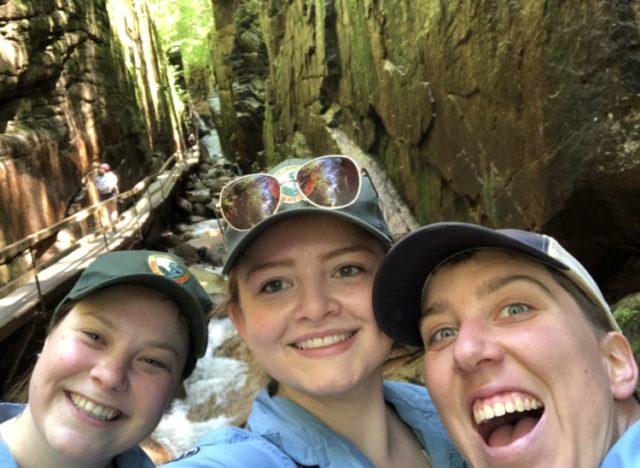
Interpretation does not have to look like what my current job looks like. Interpreters can work at museums, zoos, historical sites, parks, aquariums, and many other places—wherever a visitor’s experience can be enhanced by creating connections to the resource. An interpreter could look like a tour guide, a docent, a “living history” presenter in costume, a park ranger… the list goes on.
If you have more questions about interpretation, below is a list of the resources that were hyperlinked throughout this post. Be sure to enjoy the interpretive programming offered in NH State Parks this summer!
Resources:
